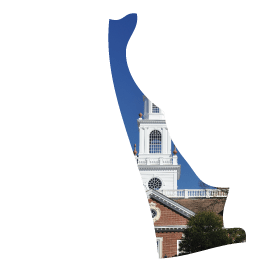Licensure Reciprocity: Delaware
Expanding the Pool of Teachers Policy
Analysis of Delaware's policies
Delaware does not support licensure reciprocity for certified teachers from other states.
Regrettably, Delaware allows a waiver for its licensing tests to any out-of-state teacher who has passed a test in a previous state, regardless of whether he or she had met its passing scores.
Teachers with current, comparable out-of-state certificates are eligible for Delaware's Continuing License. Commendably, the state does not mandate additional coursework or impose recency requirements; however, Delaware does require that all out-of-state teachers (both traditional and alternate routes) have at least three years of experience. Those with less may apply for the state's Initial License.
Delaware is also a participant in the NASDTEC Interstate Agreement; however, the latest iteration of this agreement no longer purports to be a reciprocity agreement among states and thus is no longer included in this analysis.
Recommendations for Delaware
To uphold standards, require that teachers coming from other states meet testing requirements.
Delaware takes considerable risk by granting a waiver for its licensing tests to any out-of-state teacher who has passed a test in another state. It should not provide any waivers of its teacher tests unless an applicant can provide evidence of a passing score under its own standards.
State response to our analysis
Delaware asserted that it distinguishes between teacher candidates earning licensure and earning certification. Candidates are not granted a waiver for test scores when applying from another state unless they have earned a full and valid certificate in their previous state. When this is not the case (i.e, test scores do not meet Delaware's standards), the state does not issue a standard certificate in that content area. Also, candidates are not required to have three years of teaching experience to earn licensure or certification. Rather, the state distinguishes again between those eligible for continuing licensure versus initial licensure.
Last word
Teachers applying for licensure from states with lower testing standards than Delaware will likely have earned a full and valid certificate and therefore would not be held to Delaware's standards. Evidence should be required of all out-of-state teachers that they meet Delaware's testing standards.
Select another topic
Delivering Well Prepared Teachers
- Admission into Preparation Programs
- Elementary Teacher Preparation
- Elementary Teacher Preparation in Reading Instruction
- Elementary Teacher Preparation in Mathematics
- Middle School Teacher Preparation
- Secondary Teacher Preparation
- Secondary Teacher Preparation in Science
- Secondary Teacher Preparation in Social Studies
- Special Education Teacher Preparation
- Assessing Professional Knowledge
- Student Teaching
- Teacher Preparation Program Accountability
Expanding the Pool of Teachers
Identifying Effective Teachers
- State Data Systems
- Evaluation of Effectiveness
- Frequency of Evaluations
- Tenure
- Licensure Advancement
- Equitable Distribution
Retaining Effective Teachers
Exiting Ineffective Teachers
Research rationale
http://www.ncbex.org/ .

